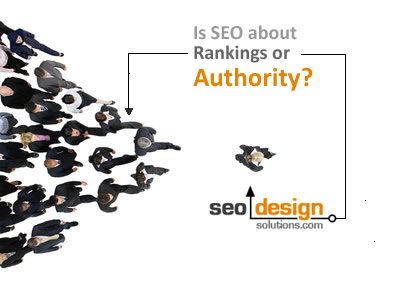How many of you thought that SEO was about ranking for keywords? Did you raise your hand? If so, you are not alone. Before you balk at this statement, reserve judgment and read into the meaning a bit further.

Does SEO Transcend Rankings?
In essence, yes, keywords are important, but SEO is about exposure and visibility across multiple mediums; more importantly the ability to aim the authority your website develops at virtually any keyword within reach.
For example, here is one example of where long-term strategy and layering your content can yield an immense ROI on time or energy invested.
If you take the time to produce an entertaining of informative post on a topic that has high demand, not only can you:
(a) have the original “shock value” in search engines as the post is launched.
(b) craft the title for maximum impact to rank for multiple variations.
(c) build internal links to other related posts or landing pages in need of link flow to produce your own ranking factor.
(d) create appeal for journalists, students, social media power users, businesses or A-list bloggers who may in turn mention or link to you.
All of these by products of SEO transcend rankings alone an allow you to reach a new audience as a result of the fall out of links that occur such as (1) Re-Tweets on Twitter “hint, hint” (2) syndication from RSS feeds and the like if the post goes viral.
All this is also a side effect of (a) having enough reach and appeal to create impact, which is another benefit of authority and (b) raising the bar on your websites SEO Ceiling (more on that topic to follow).
What is Your SEO Ceiling?
This “SEO ceiling” is like a measurement of authority that search engines assess as a result of various metrics. Depending on the degree of trust you have, the way your site is built (optimal for information architecture or sub-optimal) as well as the amount of traffic, traction and popularity your site has determines the extent of your range.
For example, we often limit newer sites to targeting 50,000 competing pages or less using phrase match (placing a keyword “in quotes”) in search engines, until the site is capable of ranking by default as a result of that ambient authority. An authority site can rank for keywords with millions of competing pages without effort!
What is the degree of your reach / exposure?
I alluded to the fact above that an authority site can “with minimal effort” oust a cunning competitor who has spent 5 years building a position for a targeted keyword, just from creating a new page and mentioning that keyword briefly in a title or on the page (see example below).
Search engines treat sites differently based on the level of domain trust and on page strength that they exhibit. For example, try searching for the key phrase “new business development” in Google and there is a post from just a few days ago we published.
Even though business development or new business development is not the focal point of our website topic or theme, the fact that our domain strength had enough “pent up energy” to catapult that keyword right into the top 10 is a testament to the power of trust and our SEO ceiling.
Each website has its own threshold, but you have to test it to see just what types of keywords or competing pages for a key phrase you can acquire as a result of SEO.
The key phrase mentioned has over 4 million competing pages, and our post about new product development went right to the top of Google search results ethically “without backlinks” to make its debut just a few hours after publishing it.
The purpose is not to brag, but to show that when your website gains an authoritative stance in one arena, you can use transference to rank for other topics (even if they are not a primary topic in your site) and acquire a high ranking search engine result page position.
You might ask yourself why, but the answer is simple, because search engines serve as gatekeepers of quality between the web and those who use them to search for products, services or entertainment. Once you have a history of creating quality content, your relevance score increases and that trust directly translates into rankings or search engine ranking factors.
Eventually, over time, when the site gains a higher degree of collective page strength, that strength flows upward back to the root of the domain and then through links cycles deeper and deeper into the pages like a cycle (depending on site architecture).
Depending on the frequency of that cycle, new keywords emerge and your website starts to stem and rank for a higher degree of concentrated topics (as a result of theming the content) as well as unintentional keywords (based on the cross-polarization of content, relevance, and query / vector space demand).
What occurs next is, keywords mentioned sparsely on a page are considered keyword modifiers and are capable of being returned as a relevant hit for an array of search queries.
Also, eventually the site transcends the node of authority it may have in one arena and is even capable or ranking highly in search engines for off-topic tangents or specific sub topics (depending on how you implement the process of stemming).
The key here is not to waste (domain authority) on keywords that don’t convert, but instead devour related keywords laced with intent that can deliver consumers or power users to your most cherished content for consumption.
By observing the degree and development of that authority, you can continually harvest and extract rankings for related keywords and key phrases that exist under the umbrella of your SEO ceiling.
In other words, if you can rank in the top 10 results for a keyword with 100,000 competing pages by simply creating a blog post, with no back links and instantly appear as a result of your RSS feed in the top ranking results, then you should be able to create a static page and anchor that post to it to lock in a long term landing page / position.
So, instead of looking at SEO from the bottom up and thinking about “if I could only rank for keyword X”, instead, focus on creating enough authority so the strength of your domain can catapult any keyword under the threshold instantly in front of eager eyes who are compelled to click on your offer.
Once you determine what your SEO ceiling is, you can easily build a stable of relevant keywords by just paying attention to what keyword clusters rise to the top of search results as well as keywords waiting in the rafters on page 2 or 3 of search engines.
Remember, SEO isn’t about keywords “they are merely a by product”. SEO is about building an authoritative domain and authoritative pages so that when the need arises for you to “rank for something”, not only do you have the capability to go back to harvest keyword-rich pages from the past for internal link weight, but you also can create new pages to catapult a new keyword to the top (for testing or conversion).
SEO is about time, opportunity and rankings and finding your SEO ceiling (your websites degree of authority to rank for a new keyword), however most only consider the rankings part of the trinity.
Of the two types of optimization (1) intentional and (2) unintentional opportunity is the main force. Just like when you create a page, it is not so much for you as it is for the intended visitor (and their needs). Much in the same way, if you plan to invest time and energy into acquiring a higher position for a keyword or series of them, then you will need to engage “the process of optimization”.
From experience, we know that over time the end result of SEO becomes clearer as you approach measurable / tangible results. However, don’t let that dissuade you into a false sense of security by assuming that if you build it, they will come.
It’s more like, build it anyway, just in case you need to use it later when the need arises.
That is real SEO, implying that you should understanding the need, supply and demand and the time it takes to produce the effect of rankings.
This coupled with awareness of the SEO ceiling and combining that momentum (as a result of cultivating a websites theme) with landing pages designed to convert are a powerful combination (much like a juggernaut) in the search engine result pages and is a pure nightmare for your competitors.
The first thing is, determining which keywords and themes already have traction as well as what you intend to do with it.
It doesn’t take a genius to figure out that some keywords rank higher than others in less time, but at least now, you know how you can create additional leverage and use links, new content or appeal to reach a larger audience through search engines, editorial review or simple appeal.









I was not sure but you have given me more insight, thank you.
Great post. Few minutes ago I was blabing on another forum about the value of backlinks etc. If only I had read this post before then I would have known a lot more.
Thanks a lot for this post. There’s so much to learn about SEO and your blog is helping to shed light on a lot of misconceptions in the industry. Thanks a lot.
Website owners have one thing in common, and that is to drive traffic to their website. The most common way to promote your website is through SEO – or search engine optimization.
I think that people get too obsessed with their rankings. A lot of people truly freak if their rank for keyword X drops or gains 2-3 spots in a day.
I think giving clients an understanding of why developing overall authority (and not rankings) is absolutely critical to having success in SEO.
I feel like I’m breaking through the matrix… Just learning SEO recently and am glad I found this site. I’ll be sure to be on it to continue my education.